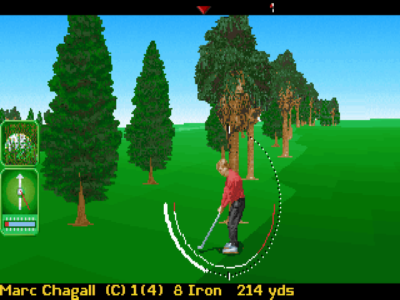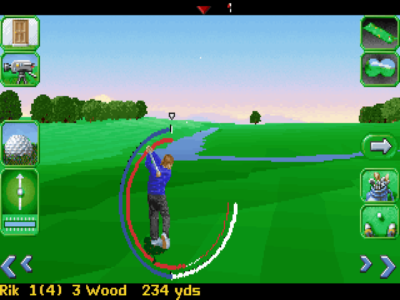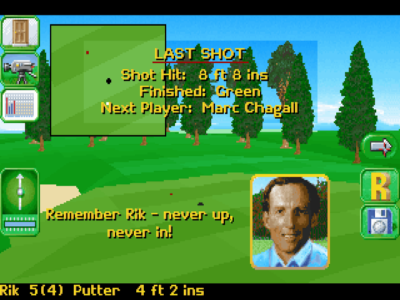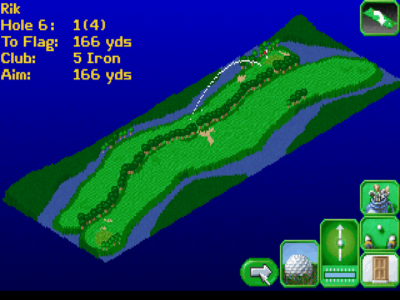
David Leadbetter’s Greens
Written by: Rik
Date posted: June 16, 2007
- Genre: Sport
- Developed by: Microprose
- Published by: Microprose
- Year released: 1991
- Our score: 6
We all have our favourite sports and frankly, golf isn’t one of mine. Not the most promising way to begin a review of an ancient golf game, I’ll admit, but it’s probably best to be honest and upfront about it all from the start. Without wanting to incur the wrath of any golf fans by launching into a bitter and scathing attack on their beautiful game, it’s not something I’ve ever been able to summon any interest in either watching or playing. I’d be tempted to say that it’s boring, except I don’t like it when people say that about cricket – that means they just don’t understand the layers and intricacies of the greatest game ever invented. So maybe that’s it – I just don’t understand golf.
Still, computer games have a funny way of making you think that you might prefer pretending to play a sport when you’re actually sitting in your pants in the middle of the night to actually going outside and doing it for real. Personally, while I’ve found that to be true in certain cases (the thought of playing any cue-based game in anything but a completely empty pub brings me out in a cold sweat, but give me a Jimmy White game and I’ll happily, er, strip to my pants and have fun with it), most of the time you find I just can’t be bothered. I’ve bought Tiger Woods games and hacked about aimlessly with them, and while the whole experience was marginally more enjoyable, and considerably less embarrassing, than my last visit to a pitch-and-putt, it didn’t readily qualify as fun.
I did enjoy this one when it first came out, though, albeit in its Atari ST incarnation known simply as ‘Microprose Golf.’ In fact, I remember its relatively simple charms being enjoyed, bizarrely, by my whole family, who used to gather round the family computer on a Sunday to participate in a round of fake golf, despite everyone else pretty much sharing my ambivalence towards the real-life game. The PC version bears the name of David Leadbetter, who the internet tells me is the world’s second-best golf instructor. Leadbetter’s contribution does amount to slightly more than just allowing his name to be plastered all over the title screen, and he pops up occasionally in-game (well, a quite blocky, badly-drawn picture of him does) to give you tips on club selection and so on. The game apparently stores information on each and every shot you take, and virtual Dave does occasionally chip in with something along the lines of ‘You’re tending to underhit shots with this club’.
Other than this fairly useless gimmick, though, this is the same game underneath. It almost goes without saying that if you want an up-to-date, cutting-edge virtual golfing experience then this shouldn’t be your first stop, and it may be worth mentioning that DLG doesn’t even provide the full range of real-life players and tours from the year in which it was released. If, on the other hand, you aren’t really bothered about all of that stuff, then you’ll find little to complain about here – there are six courses on offer (that’s 108 holes, stat fans), which is more than enough to satisfy the casual golfer, and while there aren’t any recognisable names on the leaderboard, you can at least give your own golfer a silly name and make him or her wear whatever colour jumper you like (within reason).
Once you’re out on the course, it’s all fairly easy to navigate. You begin by selecting your club and setting your aim on an overhead shot of the hole, and then you take a swing at the ball, using a reasonably straightforward ‘tri-click’ method (once to start, another at the top of the swing, and a final one as you strike the ball) to control the shot. Putting uses a slightly different power and aiming system, with the main things to consider being the slope and speed of the green. Annoyingly, the game uses rather ambiguous and blocky icons to represent the various menus and actions available to you, but once you’ve worked out what they all mean, the interface is actually pretty straightforward.
You can adjust the difficulty level to suit your level of competence, although even on the Novice setting, it’s no picnic, despite the game telling you exactly where to stop your swing and not punishing poorly executed shots too severely. If you’re feeling confident, you can turn this help off, and beyond that, there’s scope to tamper with your stance and tee position, experiment with club selection and adjust your shots manually while taking into consideration other factors such as wind speed. ‘Easy to play, hard to master’ is a quite a tired cliche to roll out, but it does apply here – you don’t battle against the interface, and it’s easy to hit shots quite well, but at the same time, you’ll only do well on the tournament mode with a good deal of practice.
In single-player, you’ll be reminded of your shortcomings by being paired with an AI golfer, who’ll probably be much better than you. My partner, a left-handed, red-shirted chap by the name of Mark Chagall, frequently birdied holes while I was still hacking my way to the green. If you’re an irritable sort (and I am), you’ll probably start to see your AI buddy as your #1 enemy in the whole world, and when they do make the odd mistake, you may well find yourself shouting ‘YEEES!’ and performing some kind of pathetic celebratory ritual. Still, if you actually bother to watch what the AI players are doing, you can actually pick up a few tips that you can use to improve your own game. Multi-player is probably more fun if you can convince a couple of people to join you – especially if they’re both crap.
Aesthetically, I personally think it still looks and sounds pretty good. I remember reading a round-up of PC golf games only a couple of years after it was released which described the graphics as ‘depressingly post-nuclear’ – which seems a little bit harsh. Admittedly, the courses are a little bit bleak, but although the untextured polygons aren’t particularly flash, I find this approach infinitely preferable to the flat ‘photo-realistic’ approach employed by Links, PGA Tour and the like until comparatively recently.

How do you like that, Chagall? Not so frickin’ smart now you’re in the trees, are ya? I eat pieces of shit like you for breakfast!
Sound is best described as ‘functional’ – in the options screen, I was surprised to see ‘commentary’ as an option, but you don’t actually get anything vocal in-game; it just means that text comments like ‘And that’s a double-bogey for Rik’ appear at the end of a hole, accompanied by another blocky rendition of a face, this time of a generic (I assume) golf commentator. Other than that, it’s little more than a few swishing sounds and short clips of polite applause.
Overall, then, David Leadbetter’s Greens is a pleasant little golf game that’s easy to get into but which also has a surprising amount of depth for those who want it. It’ll probably appeal more to the casual PC golfer rather than those who know their 3 Wood from their 9 Iron, and if you know deep down that you’re never likely to care who wins the [insert name of real, prestigious golf tournament here], you’d probably be best off resisting the lure of a recent-ish copy of Links or Tiger Woods and giving this game a go instead.





 Posts
Posts